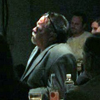Piano virtuoso Joshua White’s Oct. 10 Quintet performance at the Loft had been circled on my calendar for months, and to say that they didn’t disappoint is a considerable understatement.
White’s group was populated by the cream of the Southern California avant-garde: LA saxophonist Gavin Templeton, Irvine trombonist Michael Dessen, plus San Diego bassist Mark Dresser and drummer Kjell Nordeson.
After spending a considerable amount of time writing material and experimenting with notational methods for the band, White, inspired by his recent free-improvised set at the SDMA’s decided just before the group’s previous concert at the Blue Whale in Los Angeles to jettison the idea of compositions for a free collective improvisation approach, which they repeated for the San Diego concert.
Dresser led off the first set with bowed harmonics and moaning deep tones while the pianist tinkled softly in the background – suddenly Dessen was out in front with obscene, chortling discourse as Templeton prodded him from the sidelines. As the dynamics approached a fever pitch, White and Nordeson interacted like veteran boxers at a suddenly malevolent sparring session: bobbing and weaving – tripling up on the jab – and seeking the opportunity to land the big punch. Templeton entered the fray – somehow hanging against the gale-force assault of Nordeson to posit acidic squiggles while White and Dresser churned a swirling center of gravity.
This was all pointing to an evening of textural group improvisation – like a five-way conversation – dominance ebbed and flowed in the moment. Dessen’s gutbucket plunger mute brayed against the maelstrom – then it was White, who had been observing from the sidelines – breaking into the spotlight, tattooing the keys with wicked, pneumatic strokes as Dresser turned up the heat with two-handed slaps across the strings. Nordeson kept a constant storm of rattles and pops going without ever playing too loud or reaching for a cliche and Templeton drove his commentary straight to the outer limits with scoured multiphonics. A sudden shift in volume led to a soft dialog between trombone and bass before the pianist reemerged alone with a series of almost Baroque arpeggio sequences that turned on a dime into a violent battery that sounded like Edward Scissorhands on amphetamines.
The second set was opened by a brief, completely-out-of-the-box drum solo from Nordeson, racing around the kit with a mallet in one hand and a small cymbal in the other striking skins, wood blocks and bells with soft knocks and clatter – at one point sounding like what would happen if a ring full of keys were dropped into a blender. When the band surfaced, there were simultaneous vignettes that toggled between the busy conversation of piano and bass and the yearning, mournful glissandi of Dessen, who wailed like an innocent man in solitary confinement.
White had discussed situations that both should and might happen with the band beforehand, which helped shape the narrative arc of density, balance and individual exposition, and I was particularly impressed by the amount of space he allotted while watching the forces he set in motion reach fruition.
Often he simply listened with hands folded – other times, he held those hands suspended in tangent to the keys, waiting for the moment to pounce. At one point, a primal, almost Dixieland sense of swing surfaced, only to shift to an stormy atmosphere through Dresser’s brutal pizzicato and Nordeson’s shape-shifting agogo-bells. Then it was White, seizing the moment with a burst of kinetic energy that sent all ten digits in different directions as his hands became hard-to-track blurs that pounded slugfest clusters into the rafters.
Once again, for the final time, the dynamics downshifted into a pensive hush as glacial chords drifted into focus; Dresser’s bow sighed like a woman in distress, and the horns bickered with mocking commentary. One hammered piano note gathered all of the contributors into a unison decay – and just like that, it was all over.

Robert Bush is a freelance jazz writer who has been exploring the San Diego improvised music scene for more than 30 years.

